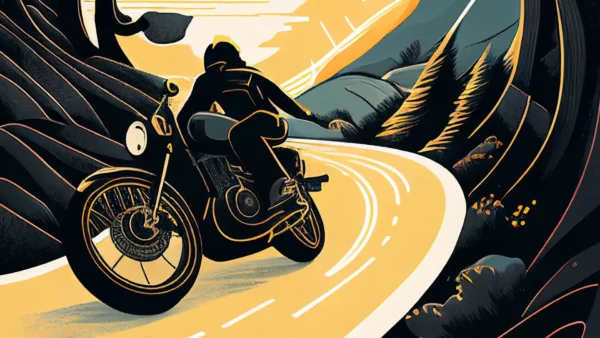Whether you’ve just earned your M2 or you’re a seasoned rider, an advanced riders training program can help you boost your skills, confidence, and safety on two wheels.
Also called experienced rider courses or pro rider training, these optional, non-regulated programs can be a great way to connect with other riders, learn specialized techniques, and dust off your chaps after a hiatus from riding.
Choosing the right advanced riders program
Unlike the M1 and M2 courses which are designed to give all riders the basic knowledge and skills needed to pass MTO licensing requirements, advanced riders programs let you hone in on exactly the type of training you want.
Start by considering the skills you’d like to work on. Maybe you’re having a tough time dealing with heavy traffic, or you’d like to gain some confidence riding in wet conditions. Perhaps you’ve just purchased a bigger bike, and you’d like to spend some time working on your skills under the watchful eye of a seasoned instructor.
Think about whether you’d like to use your own bike or take the opportunity to try a different motorcycle on a controlled off-road course. While most advanced rider courses are designed to teach you skills on your own bike, some classes do give you a chance to try out different makes and models of motorcycles, so be sure to ask before registering for a training program.
Added savings on your motorcycle insurance
In Ontario, Echelon offers additional discounts on your bike insurance premiums for policyholders who complete advanced rider training. Your Mitch motorcycle insurance specialist will review your existing policy and calculate the discounts you could be eligible for.
Advanced rider training courses in Ontario
Many of the same schools that offer M1 and M2 classes also have training targeted towards experienced riders who want to build on the basics they’ve learned during their licensing training,
Here’s just a few of the advanced rider training courses offered through MTO-approved schools and training centers in Ontario:
Rider training institute
Based in Toronto, RTI has over 10 rider training centres throughout Ontario, including Ottawa, Orillia, St. Catharines, and Guelph.
What makes RTI unique is the fact that it’s a registered not-for-profit association, run by riders, for riders.
Experienced riders with at least four seasons of street riding experience, fewer than 6 demerit points on their driving record, and a genuine desire to teach riding skills can apply to become an RTI instructor. Instructor candidates need to spend approximately 100 hours completing classroom training sessions, homework, and two hands-on apprentice weekends.
Georgian College
In addition to their MTO-approved new rider licensing courses, Georgian offers a number of rider training programs geared towards those who are either returning to the road after being off their bike for a while, as well as riders who simply want to enhance their skill level.
Georgian also offers a unique “Try-A-Spyder” session that gives licensed riders a chance to try out a 3-wheel Can-Am Spyder on a closed course that’s supervised by experienced instructors.
Motorsoul Riding School
This non-profit, MTO-approved motorcycle school was founded by Ginny Allen, the first and only female Motorcycle Demonstration Rider for both the MTO and the Serco Drivetest. Allen is a passionate supporter of lifelong learning for riders, and her school offers a wide range of specialized clinics aimed to help promote skills development among experienced riders of all ages and abilities.
Rider Enhancement clinics at Motorsoul include Big Bike Handling, Slow Speed Control, and a unique Passenger Riding clinic designed to teach non-riders how to be safe, responsible passengers.
Niagara College
Niagara College is home to one of the most established rider training schools in the province, and since it’s inception in 1983, they’ve trained over 7,000 new and experienced riders.
Niagara offers a range of advanced rider training courses for licensed riders, including skill improvement levels 1 and 2; one-on-one coaching; and instructor certification programs. They have an extensive fleet of well-maintained, modern bikes available for use, or riders can bring their own gear.
Should you take training courses from a aon-MTO approved school?
It’s important to note that there’s lots of additional skills and brand-specific rider classes offered through organizations and private schools that are not accredited through the Ontario Ministry of Transportation.
Many of these non-accredited programs are highly respected by professionals within the industry, and instructors can include ex-RCMP motorcycle trainers, product reps, and other riders who’ve logged countless miles on two wheels.
If you’re considering taking an advanced riders training program from a non-MTO approved school, be sure to do your research. Ask other riders for referrals, request confirmation of the instructor credentials, and be certain that the school has the right insurance coverage in place before you spend your hard-earned money. In most cases, your insurance provider will only offer discounts for completion of advanced rider courses taken through MTO-approved institutions.
Give us a call, we’ll let you know your motorcycle insurance options in Ontario and answer any question you might have.
Looking for motorcycle insurance?
Speak with a Mitch Insurance broker today to get a quote on Ontario motorcycle insurance coverage.
Call now
1-800-731-2228








The picture at the top of this page – “Advanced rider training courses in Ontario”
Open face helmet
No gloves
Stretchy, skinny jeans
No socks
Adidas sneakers
Hi Ken,
We understand that the original image wasn’t reflective of safe riding practices, so thanks for bringing that to our attention! We’ve replaced the image with what we believe is a more fitting reflection of an advanced rider wearing proper gear, footwear, and a full-face helmet.
Thanks for the heads-up!